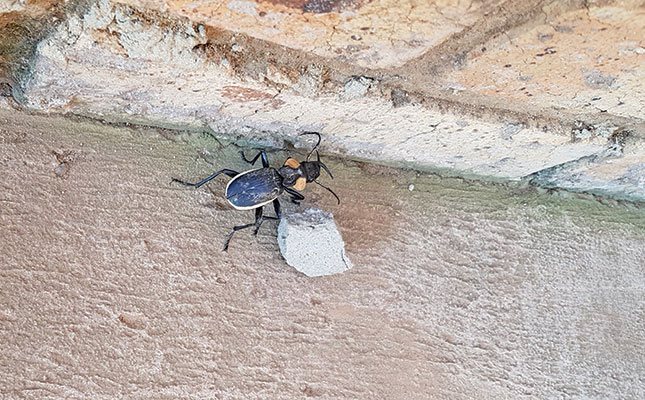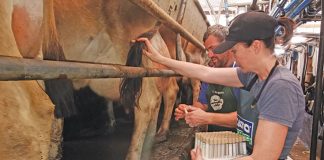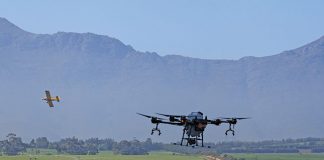
Photo: Dr Mac
As soon as it rains, the Anthia beetle, which feeds on ants, grasshoppers and other insects, comes out. It is also known as the sabre-toothed ground beetle and as the oogpister in Afrikaans.
The latter name describes the beetle’s ability to squirt a highly irritant fluid at the eyes of humans, animals or birds it considers a threat.
It belongs to the Carabidae family and is between 4cm and 5cm long, and is black with white or cream warning markings. While these beetles cannot fly, they are fast running.
Anthia beetles are often encountered in horse paddocks, where horse manure acts as a breeding site.
They have very large mandibles, used for grasping their prey, but which are also used to bite people who try to pick them up. The beetles produce and release a variety of chemicals from an opening at the end of their abdomens.
These chemicals include aldehydes, hydrocarbons, quinones, phenols and organic acids such as formic acid. As horses are generally inquisitive, they may investigate the rapidly moving beetle and thus be squirted.
They may also disturb the beetle while grazing.
Symptoms
The irritant fluid causes severe pain and even blistering around the horse’s eyes, which can last for a few days. The corneas also become red and inflamed, which can cause excessive tearing.
The horse may also keep its eyes partly closed, which can lead to partial blindness and the horse injuring itself by running into obstacles such as barbed wire.
Treatment consists of washing out the eyes with a slightly alkaline solution such as bicarbonate of soda (use half to one teaspoon per cup of water), as well as using eye ointments containing cortisone, which you can get from your vet.
Prevention
Don’t use insecticides to control these beetles, as they are the natural predators of many other pests in the environment. As they are active for only a short period during the year, insecticides are also unlikely to reduce their numbers effectively.
Anthia beetles flourish in semi-arid conditions such as overgrazed pastures. They also multiply when there is a large build-up of manure.
Removing excess manure to an area where it can be composted is thus likely to attract the beetles to a smaller land surface area where horses don’t graze.
Paddock rotation can also reduce the contact between beetles and horses on farms where the horses are run in large herds.











